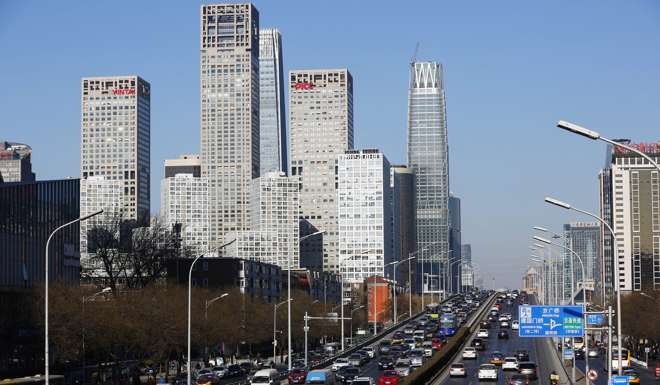
Foreign firms leave Beijing’s core office areas for newer homes
Lower costs, better facilities and a larger supply in outlying areas are luring new tenants

Boston Consulting Group’s (BCG) Beijing office moved in November from the LG Building near Guomao, in the capital’s central business district (CBD), to the Genesis Community – a brand-new, sleek-looking building near the much larger, well-known Beijing Lufthansa area.
The relocation gave the company a a lot more office space, advanced facilities, and a fresh start, said Sun Zhiyong, an employee at the company.
“The old office had access to a subway station, abundant amenities, and was even home to some of our clients. But it was a bit old-fashioned, crowded with various companies. The elevators took an age to arrive, too, and they were slow,” said Sun.
BCG now takes up a whole floor of the Genesis Community, which has a pre-installed controlled ventilation system that filters fine pollutants, within an avant-garde design.
Movable meeting rooms allow flexible seating arrangements. And the height of employees’ work desks can be freely adjusted.
Sun’s especially pleased with the office’s proximity to the airport express line, as many of the firm’s consultants have to travel to meet clients.
The Community has attracted an enviable list of tenants including Mitsubishi Corporation, investment house Macquarie Group, and Japanese advertising giant Dentsu Inc is believed to be set to move in. While French banking group Societe Generale and American power generation equipment corporation Cummins Inc are considering to move into the greater- Lufthansa Area, according to brokers.
These types of relocation have become an ongoing shift by foreign firms, who are choosing to move from crowded and costly locations such as Financial Street and Guomao, to emerging outlying areas such as Lufthansa, Wangjing, and the Olympic Park area.

“While Beijing will remain an important base for North China operations, slower growth in the country has reduced the urgency for foreign and domestic companies to expand in China.”
He noted that last year the proportion of domestic companies in the overall Beijing office market rose markedly, crossing the 50 per cent mark for the first time, as the inexorable march towards a strong domestic-driven market gathered momentum.
Beijing offices rents in the fourth quarter were basically flat, JLL said in a report, up 0.3 per cent quarter-on-quarter, with a 3.9 per cent vacancy level.
Landlords generally maintaining lower rents to attract foreign tenants, or made modest rental gains by accepting domestic tenants.
The result was slightly slower quarter-on-quarter rental growth in the city’s CBD, and noticeably slower growth in Financial Street.
“The sky-high rents in Financial Street might finally have peaked…but the high rents pushed out many foreign firms in 2016, and the proportion of international tenants there dropped 25 per cent from a year ago,” the report said. “Domestic firms in the area have cemented their position as the clear majority.”
With an average monthly rent of 620 yuan per square meter (sq m) in the fourth quarter, Financial Street is the most expensive office area not only in Beijing, but also China, according to the JLL data.
The rent compares with an average 388 yuan in the city’s CBD, and 324 yuan in the third embassy area, where the Genersis Community is located.
The sky-high rents in Financial Street might finally have peaked…but the high rents pushed out many foreign firms in 2016, and the proportion of international tenants there dropped 25 per cent from a year ago...Domestic firms in the area have cemented their position as the clear majority
Savills, another major real estate service firm, has also noted that foreign firms are leaving their traditional enclave of the CBD and moving to outlying areas, which has pushed average Beijing Grade-A office vacancies up by 0.7 of a percentage point in the fourth quarter, and average rent down 0.1 of a point.
The three largest Grade-A supply areas in the fourth quarters were in outlying areas, and nearly 1 million sq m of new supply is expected in those in 2017, which will further drive up vacancies and drag down rents, Savills said.
However, cost is not the only reason why foreign firms are leaving.
Mi Yang, an assistant manager with JLL’s research unit, said it is more about supply. The most new supply is in outlying areas, whereas in Financial Street, new supply is near zero.
Wangjing and the Olympic Park area provided 62 per cent of Beijing’s new office supply in the fourth quarter, and the ratio is expected to reach 80 per cent in 2017, according to Savills.
“Relocating to non-core areas is not a new trend, but the numbers have certainly been boosted in the past year. And the trend is not only limited to foreign firms,” Mi said.
Brand new offices offer quality facilities and services that would have been unimaginable in older office blocks in core areas.
Ping’an International Financial Centre, a tower near the Community, for instance, even boasts automated external defibrillators – life-saving emergency devices that can be used in the event of heart attacks.
While one new building in the Wangjing area, due to open its doors in the first half of 2017, has practically 100 per cent occupancy – something not seen in the area for three years, Mi said.